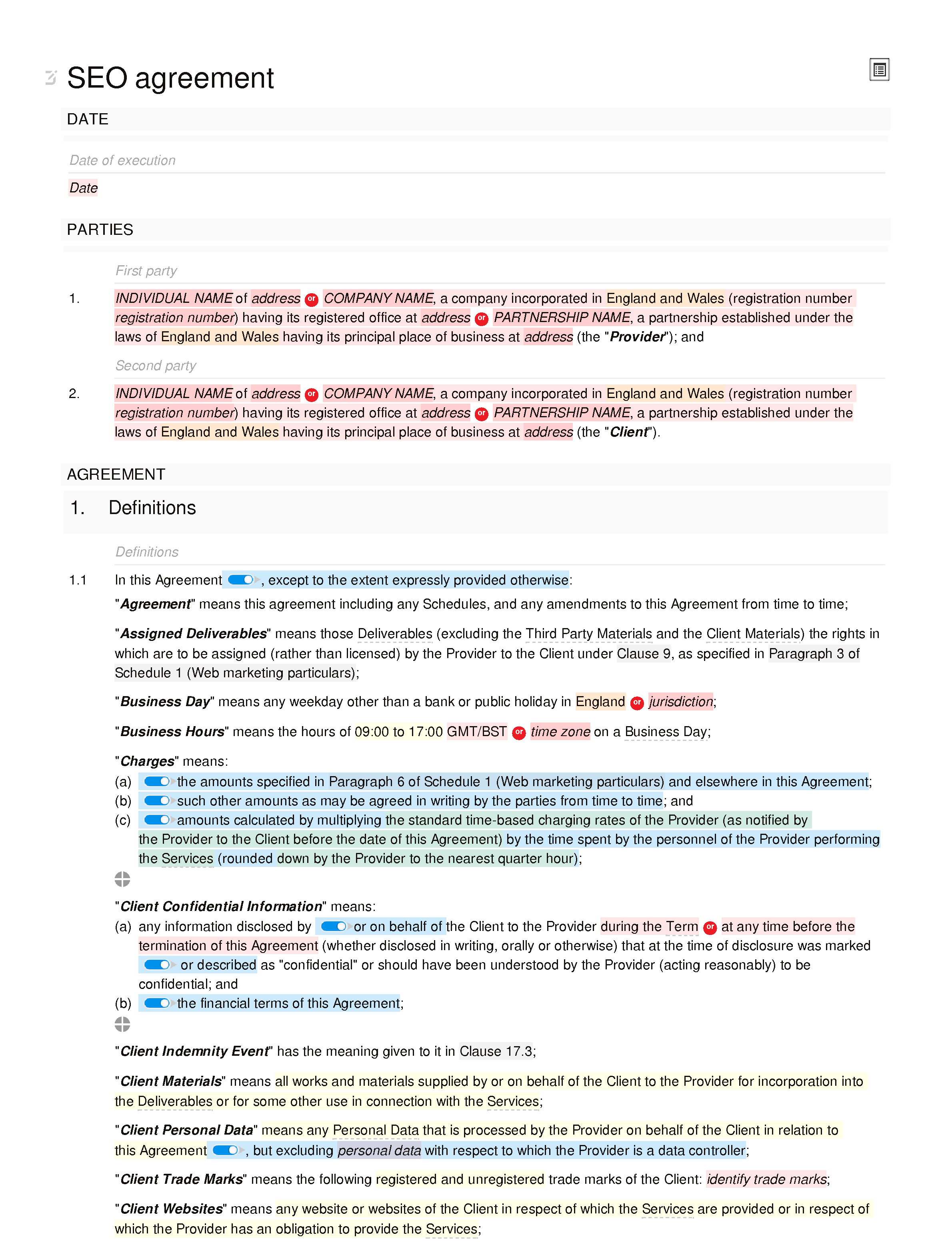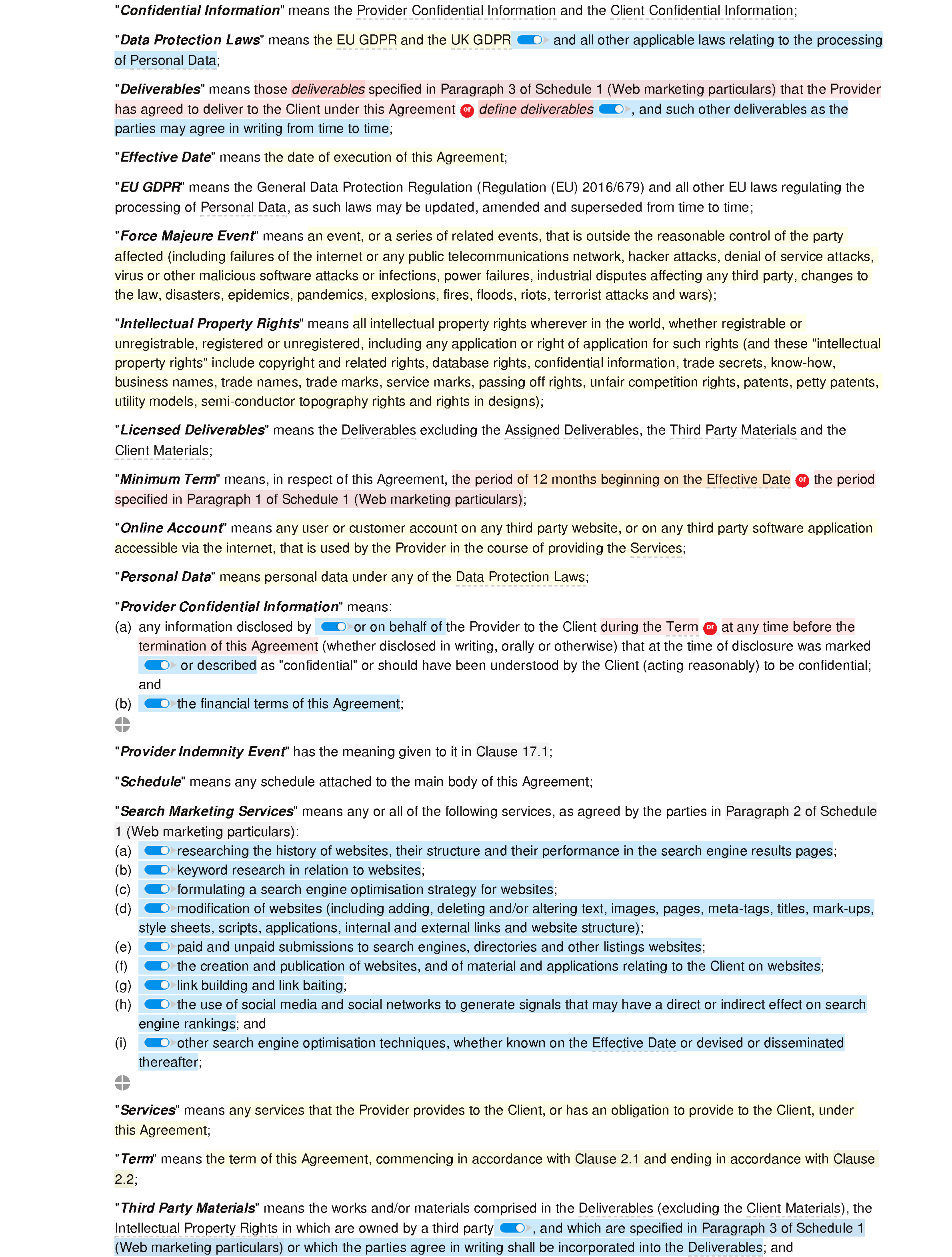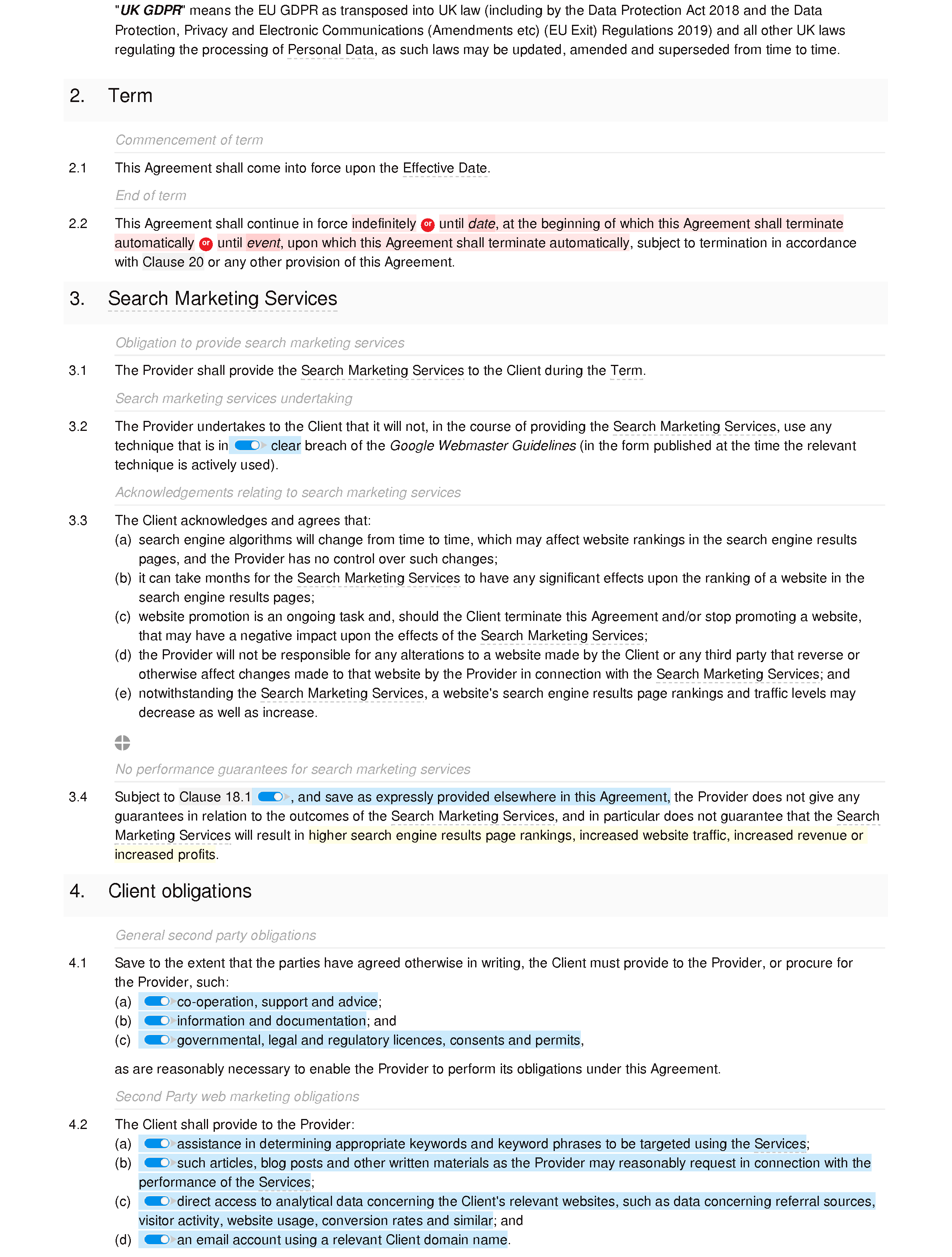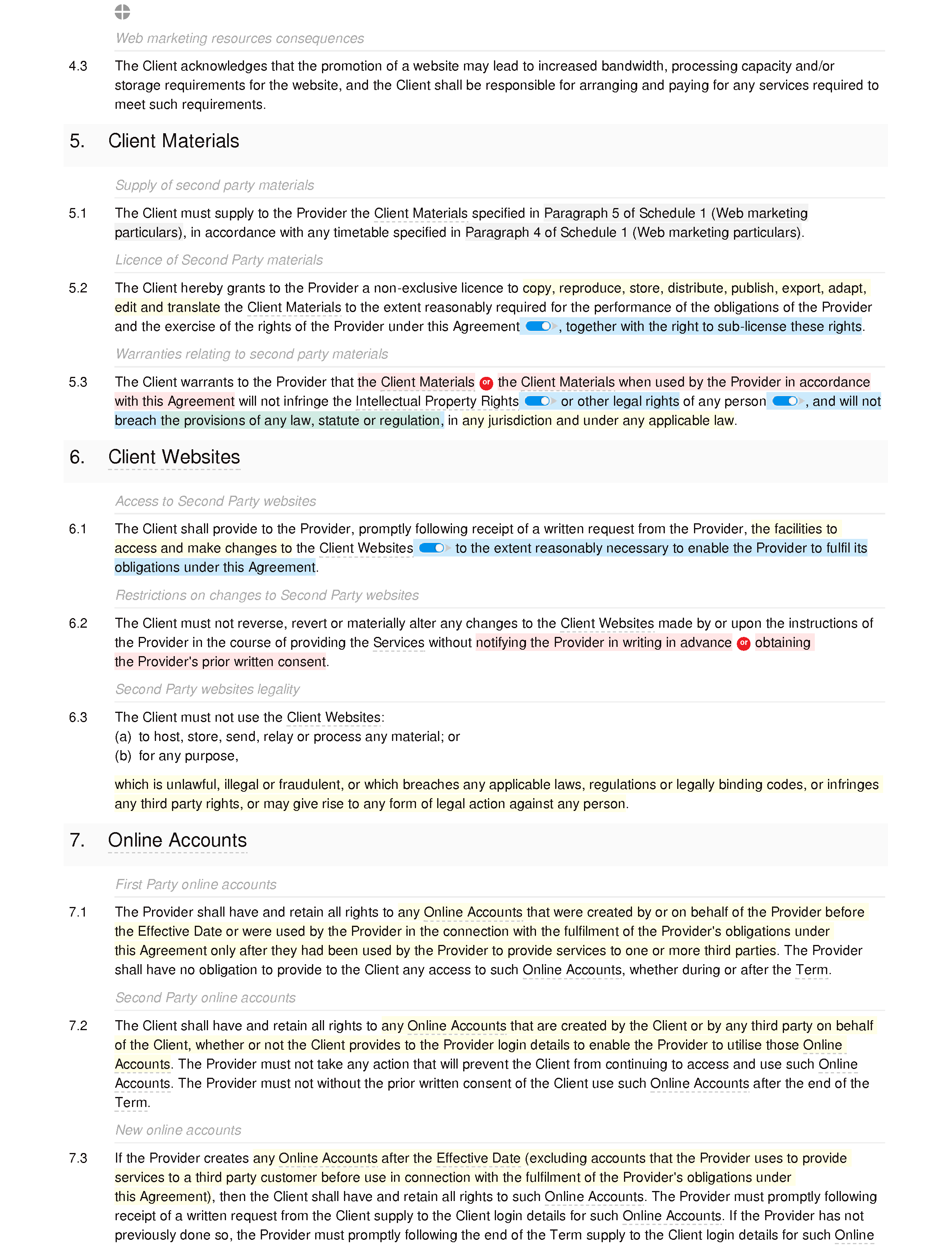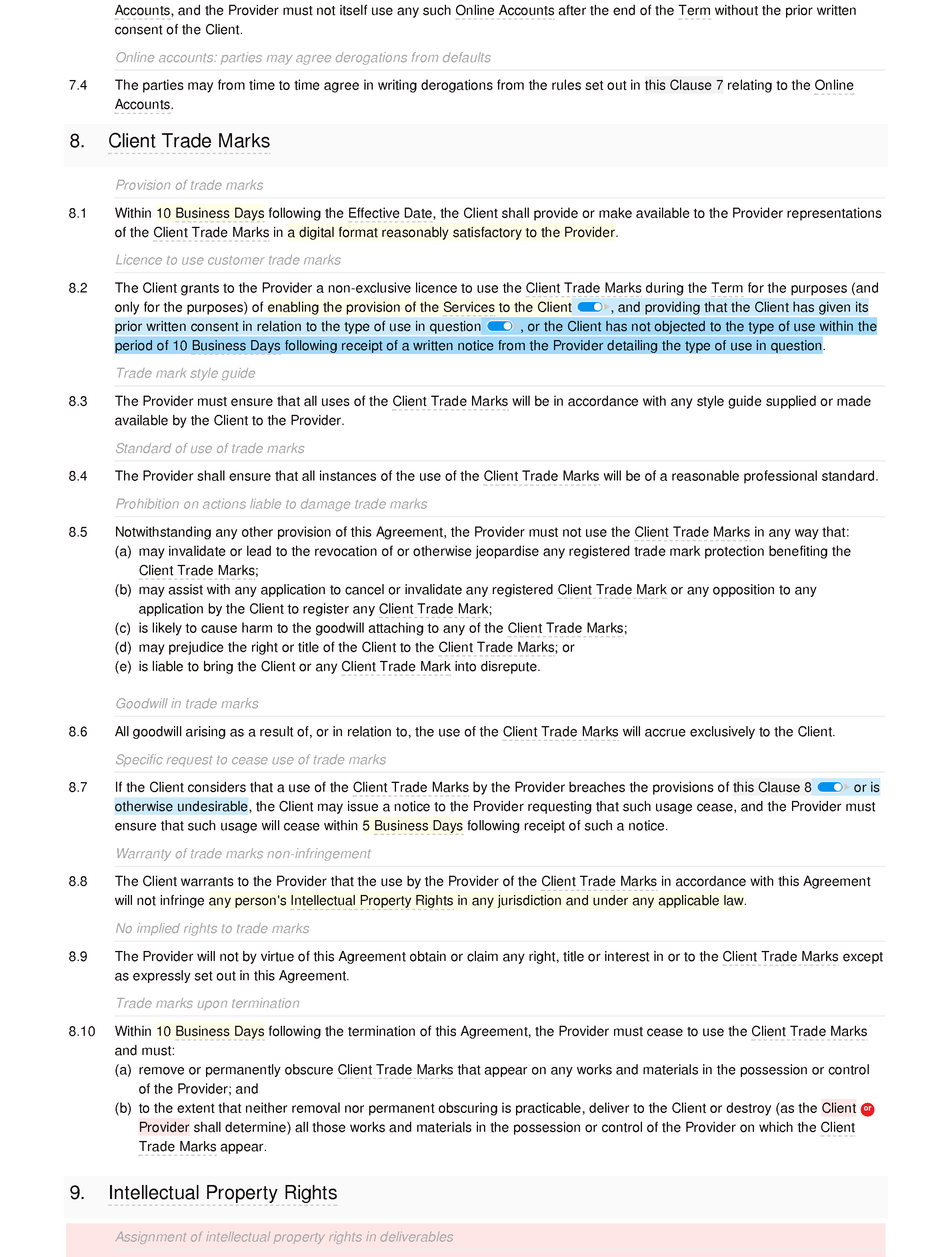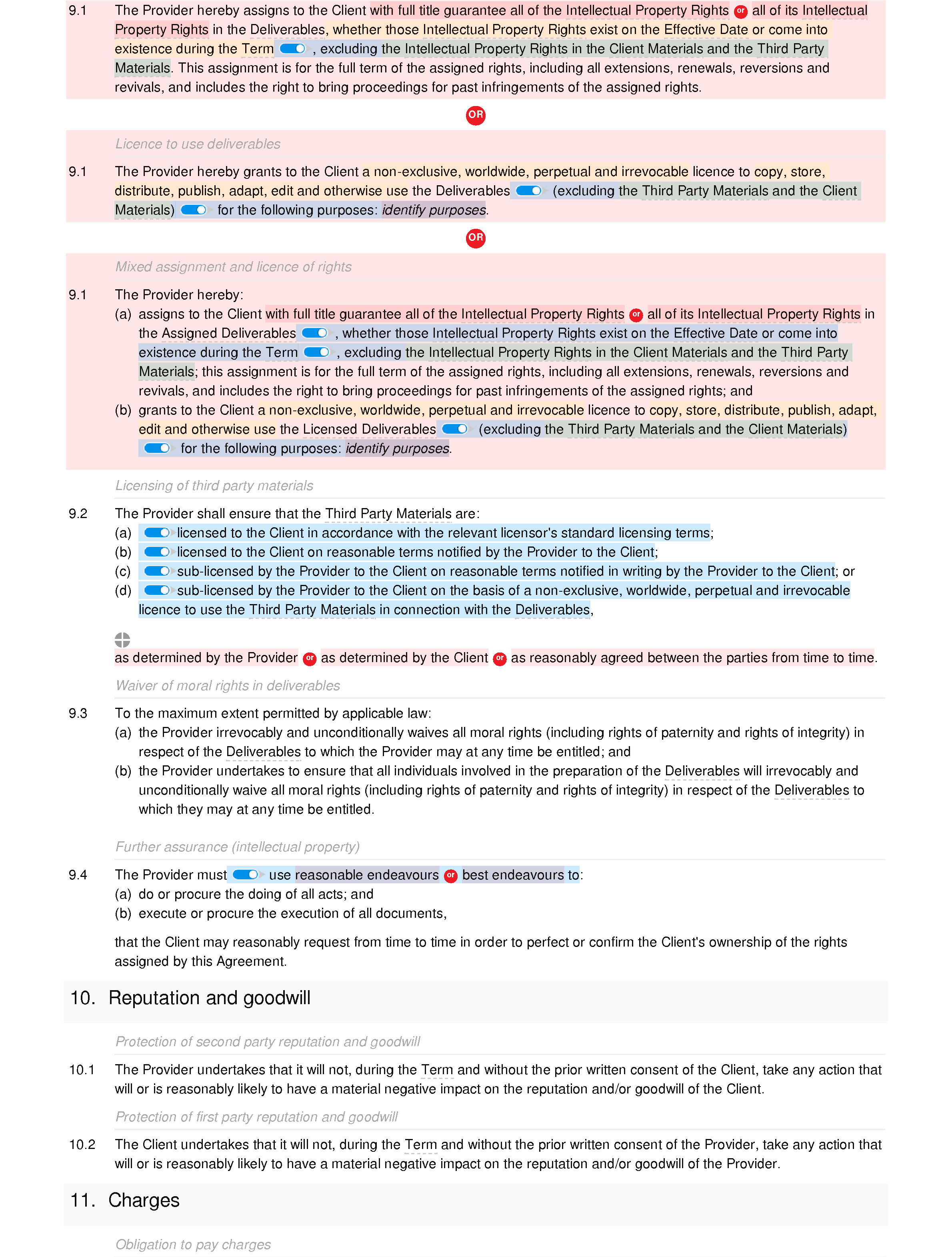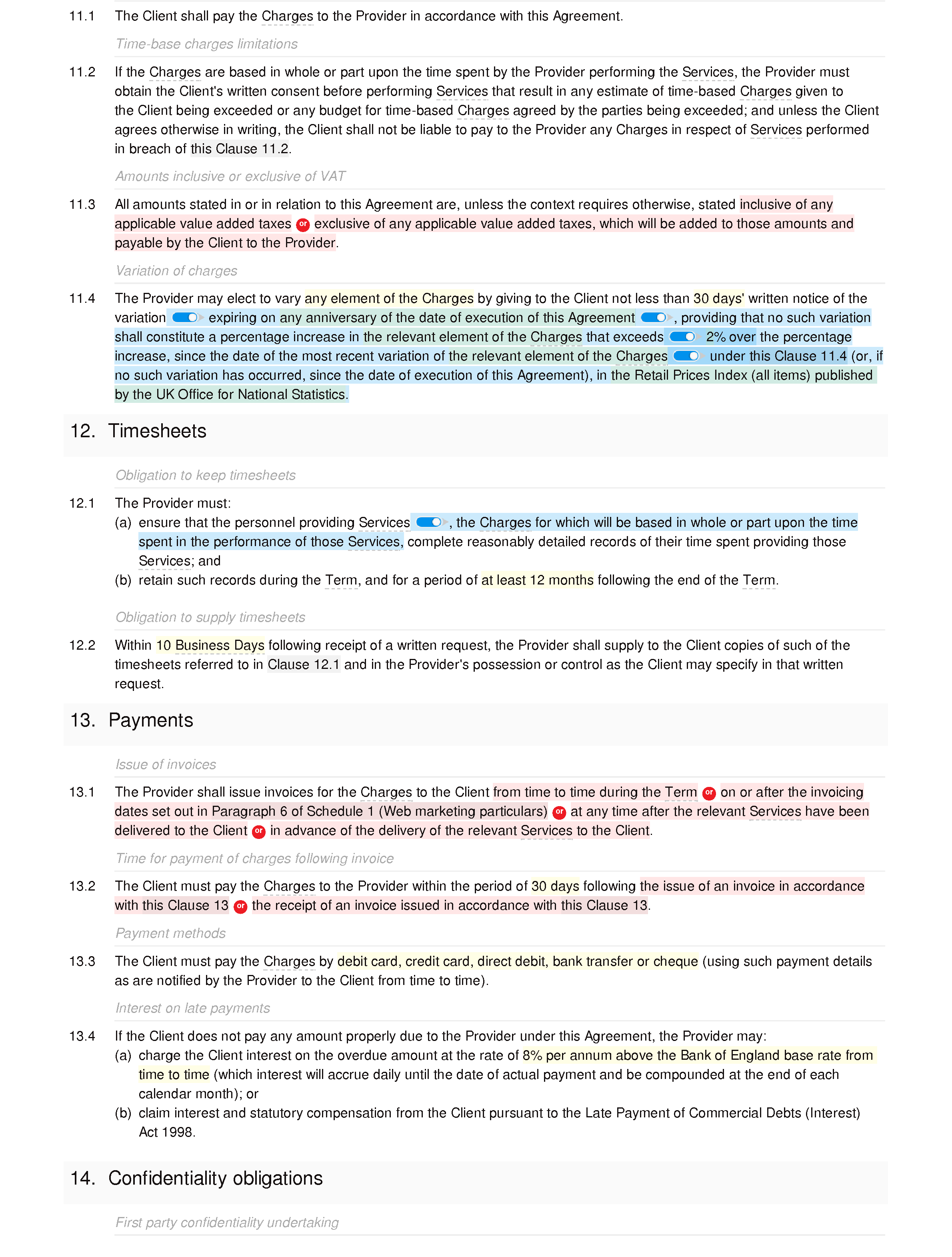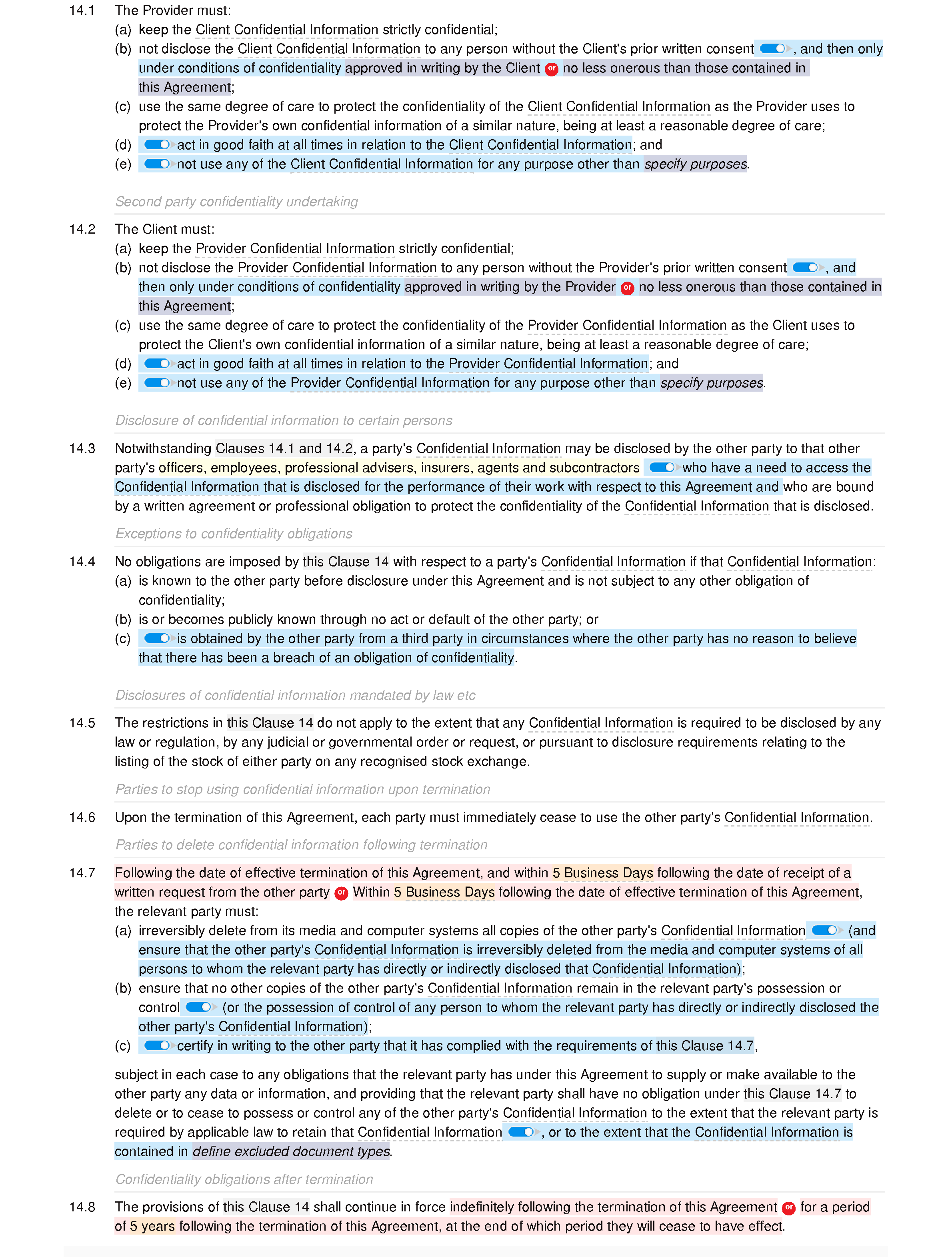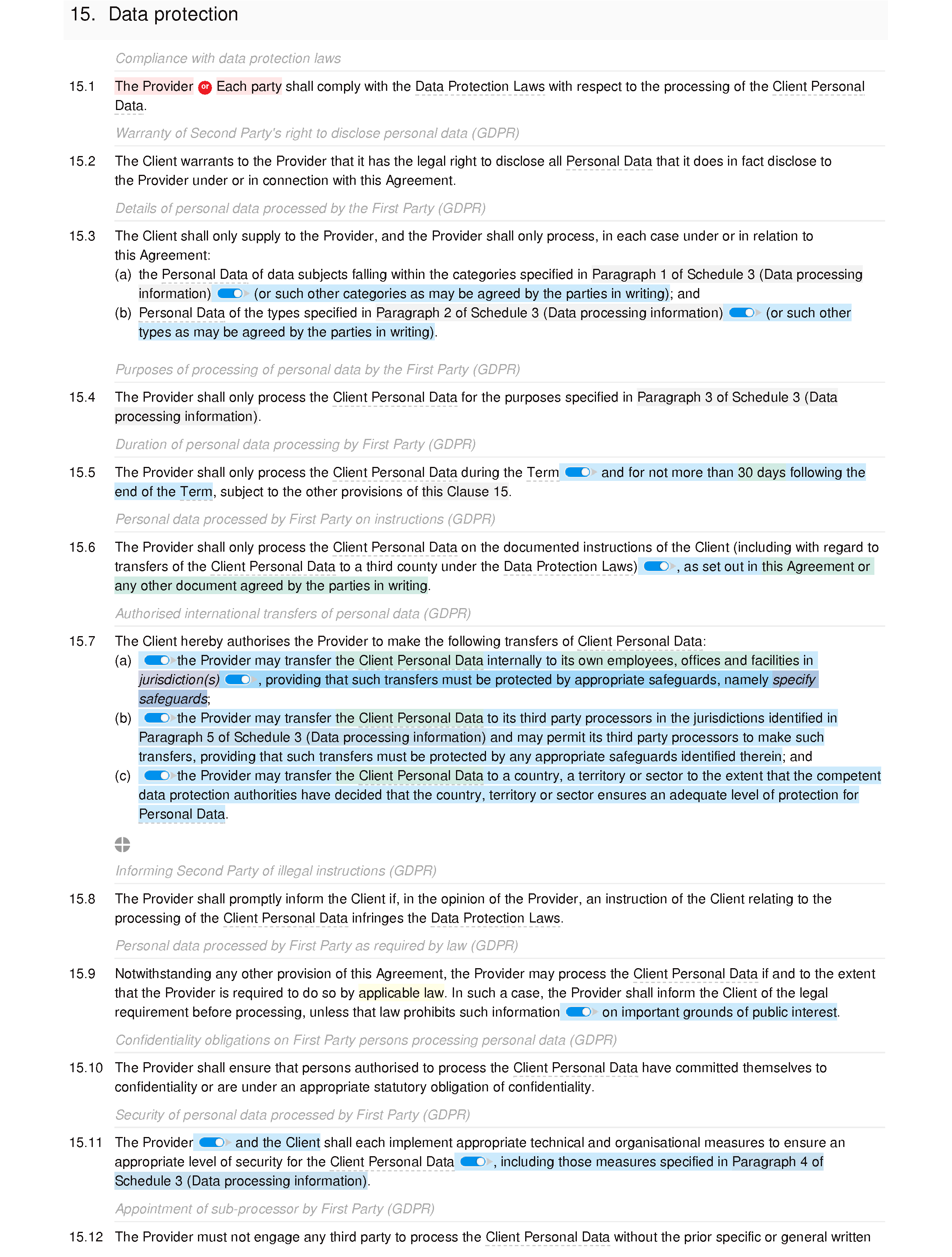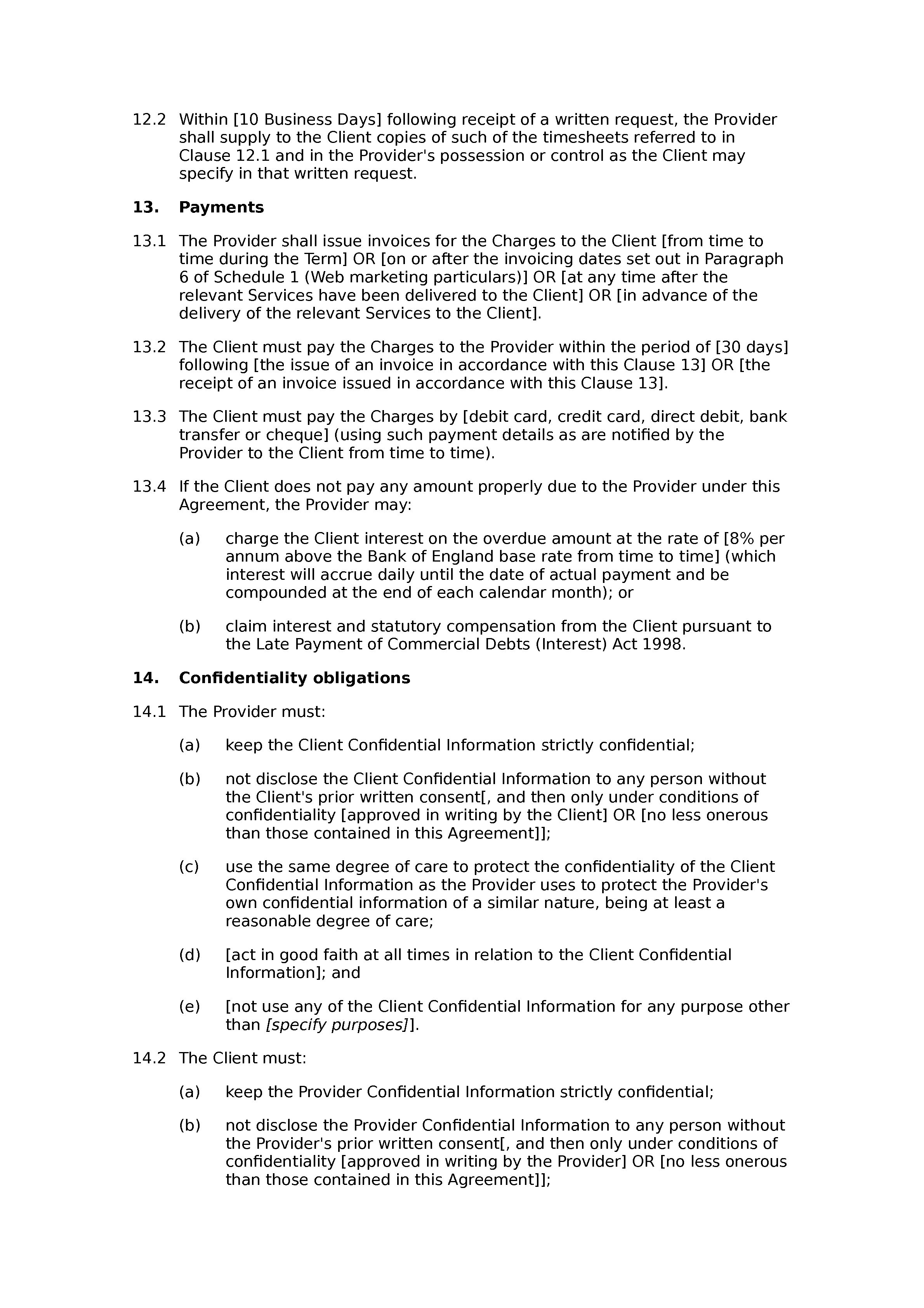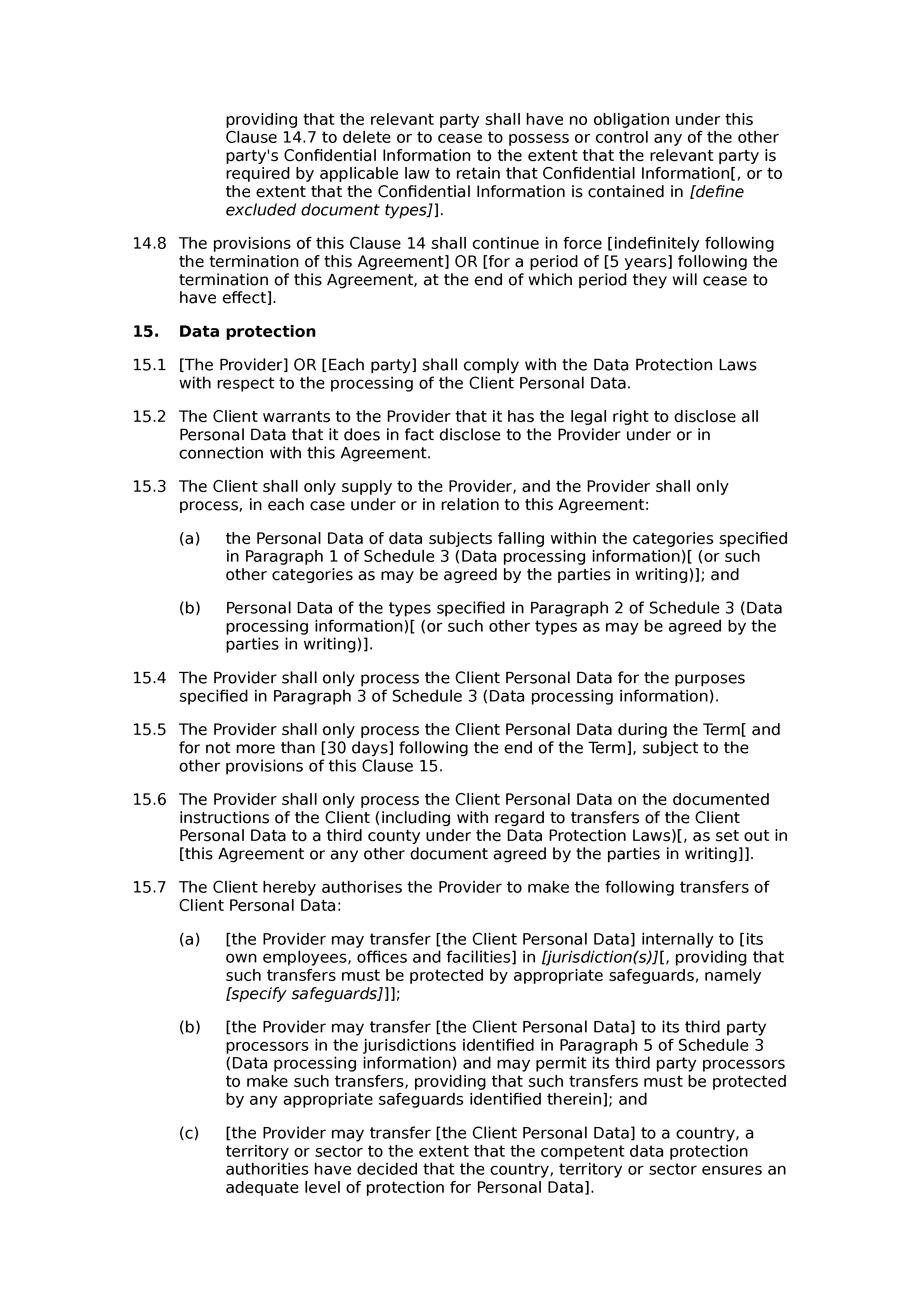SEO agreement
Search engine marketing (SEM) has come a long way since the days when a handful of meta-tags and a scattering of directory entries amounted to a useful service. Nowadays, SEM works best as part of an integrated marketing strategy, and the service provider's responsibilities do not end when the user clicks on a link in the search engine results pages.
This agreement has been designed to comprehend the wide range of obligations that may fall under and SEM contract, without explicitly covering neighbouring areas (such as email marketing and PPC management). For example, SEM advice and planning, on-site optimisations, outreach, content production and link building/baiting are all covered in one form or another.
As regards the financial arrangements between the parties, this agreement is flexible. It can cover agreed fee arrangements and time-based charging, and also arrangements involving a mixture of these structures.
Regarding the difference between search engine optimisation (SEO) and SEM: this document is called and SEO agreement for historic reasons, but equally have been called an SEM agreement.
SEO agreement contents
- Definitions: definitions.
- Term: commencement of term; end of term.
Search Marketing Services : obligation to provide search marketing services; search marketing services undertaking; acknowledgements relating to search marketing services; no performance guarantees for search marketing services.- Clientobligations: general second party obligations;Clientweb marketing obligations; web marketing resources consequences.
- ClientMaterials: supply of second party materials; licence ofClientmaterials; warranties relating to second party materials.
Online Accounts :Provideronline accounts;Clientonline accounts; new online accounts; online accounts: parties may agree derogations from defaults.Intellectual Property Rights : assignment of intellectual property rights in deliverables; licence to use deliverables; mixed assignment and licence of rights; licensing of third party materials; waiver of moral rights in deliverables; further assurance (intellectual property).- Reputation and goodwill: protection of second party reputation and goodwill; protection of first party reputation and goodwill.
- Charges: obligation to pay charges; time-base charges limitations; amounts inclusive or exclusive of VAT; variation of charges.
- Timesheets: obligation to keep timesheets; obligation to supply timesheets.
- Payments: issue of invoices; time for payment of charges following invoice; payment methods; interest on late payments.
- Confidentiality obligations: first party confidentiality undertaking; second party confidentiality undertaking; disclosure of confidential information to certain persons; exceptions to confidentiality obligations; disclosures of confidential information mandated by law etc; parties to stop using confidential information upon termination; parties to delete confidential information following termination; confidentiality obligations after termination.
- Data protection: compliance with data protection laws; warranty of Client's right to disclose personal data (GDPR); details of personal data processed bythe Provider(GDPR); purposes of processing of personal data bythe Provider(GDPR); duration of personal data processing byProvider(GDPR); personal data processed byProvideron instructions (GDPR); authorised international transfers of personal data (GDPR); informingClientof illegal instructions (GDPR); personal data processed byProvideras required by law (GDPR); confidentiality obligations onProviderpersons processing personal data (GDPR); security of personal data processed byProvider(GDPR); appointment of sub-processor byProvider(GDPR); authorisation forProviderto appoint sub-processors (GDPR);Providerto assist with exercise of data subject rights (GDPR);Providerto assist with compliance (GDPR); obligation to notifyClientof personal data breach (GDPR);Providerto provide data protection compliance information (GDPR); deletion of personal data byProvider(GDPR);Providerto allow audit (GDPR); changes to data protection law.
- Warranties: standard of services; first party general warranties; second party warranty of authority; exclusion of implied warranties and representations.
- Indemnities: indemnity upon breach: any provision or specified provisions (with definition); conditions upon first party indemnity; indemnity upon breach: any provision or specified provisions (with definition); conditions upon second party indemnity; limitations of liability vs indemnities.
- Limitations and exclusions of liability: caveats to limits of liability; interpretation of limits of liability; no liability for force majeure; no liability for loss of profits; no liability for loss of revenue; no liability for loss of use; no liability for loss of opportunities; no liability for loss of data or software; no liability for consequential loss; per event liability cap upon services contract; aggregate liability cap upon services contract.
Force Majeure Event : obligations suspended for force majeure; force majeure notification and information; mitigation of effects of force majeure.- Termination: termination without cause (optionally asymmetric); termination by either party without cause; termination upon breach; termination upon insolvency; termination upon non-payment.
- Effects of termination: surviving provisions upon termination; termination does not affect accrued rights; Clientdatasets upon termination.
- Status of Provider: first party is independent contractor not employee; no redundancy or compensation.
- Notices: methods and deemed receipt of contractual notices; contact details for contractual notices; substitute contact details for notices.
- Subcontracting: no subcontracting without consent; subcontracting permitted; first party responsible for subcontracted obligations.
- General: no waiver; severability; variation written and signed; no assignment without written consent; no third party rights; entire agreement; governing law; exclusive jurisdiction.
- Interpretation: statutory references; section headings not affecting interpretation; calendar month meaning; no ejusdem generis.
SCHEDULE 1 (WEB MARKETING PARTICULARS)
Minimum Term : minimum term prompt.- Specification of
Services : specification of services prompt. - Specification of
Deliverables : specification of deliverables prompt. - Timetable: timetable prompt.
- Financial provisions: financial provisions prompt.
SCHEDULE 2 (
- Keyword guarantee: search engine results guarantee by keyword; keywords and key phrases list; tracking and reporting of keyword-based search results.
- Traffic guarantee: search engine traffic guarantee; tracking of search engine traffic.
- Failure to meet guarantee: failure to meet guarantee not breach of contract; consequences of failure to meet search marketing services guarantee.
- Exceptions: exception to guarantees on breach.
SCHEDULE 3 (DATA PROCESSING INFORMATION)
- Categories of data subject: prompt for categories of data subject.
- Types of
Personal Data : prompt for types of personal data. - Purposes of processing: prompt for personal data processing purposes.
- Security measures for
Personal Data : prompt for security measures for personal data. - Sub-processors of Personal Data: prompt for identifying sub-processors of personal data.
